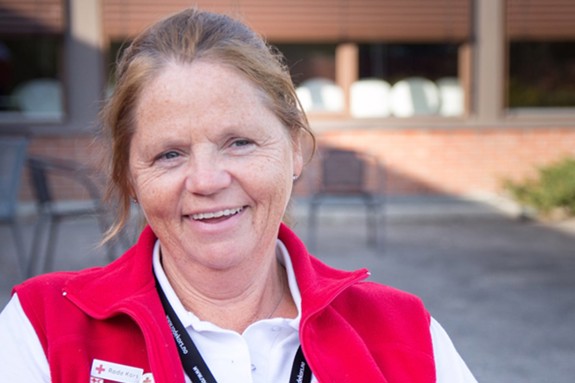”The women in my family were building institutions”
Pernille never joined the Red Cross, she was born into it. Coming from a dedicated family of Red Crossers, it has always been a natural part of her life. “Red Cross has been with me as long as I can remember”, Pernille says with a smile, while remembering the strong and dedicated women in her family: her mother, grandmother and great-grandmother, who all were active members for the Red Cross in Norway.

Times were different then. These women paved the way for what later would become central pillars of the Norwegian welfare state, such as universal health care, childcare services, child welfare programmes and programmes to support people with disabilities. “They were building institutions”, Pernille remarks, “and as a child I was brought along to meetings, visits and fundraisers”. The active women in her family also engaged their men to contribute with their skills and knowledge. “We had engineers in the family, so they were made to join committees overseeing the establishment of new institutions in the Red Cross” Pernille explains, “It was a lot about using your network and your contacts to engage people with the right skills to get the job done.”
”It’s the kind of work where you just need to do your best and be at peace with that”
As a young woman, Pernille joined the Red Cross Youth and was also very active in leadership positions for the local Search and Rescue services. During the early 1980s, she moved to the United States for studies. This was perhaps the only period in her life where she was not part of the Red Cross. But it did not last long. After few years in the US, she found herself as an American Red Cross employee working on establishing orphanages in Central America. “It was hard work” Pernille remembers, “we worked twenty-four-seven, and there were no instructions on how to do things”.
She compared the intensity of the work in Central America with her Red Cross work in Norway during the influx of asylum seekers in 2015: “It’s the kind of work where you just need to do your best and be at peace with that. You know you will never finish, and the work will never be perfect, but you just keep on going. Nobody is there to give you a job description and you need to make decisions as you go along. It’s a lot of excitement but it can also be frustrating.” Thankfully, Pernille is not afraid of a challenge and her organizational skills combined with an impressive amount of energy and positive attitude, gets her through.
”Those of us who are fortunate in life have an obligation to help those who are less fortunate than ourselves, it’s as simple as that”
After several years abroad, Pernille got married, started a family and returned to Norway in 1988, more specifically to Hobøl, a small community southeast of Oslo, close to the Swedish border. She was new to the area, but shortly after moving there, someone knocked on her door and asked whether she would like to join the local Red Cross’ children activities. It didn’t take long until she was the chair of the local branch. When asked about her unstoppable dedication to such a wide range of Red Cross activities, Pernille says “I have grown up with my grandmothers philosophy that those of us who are fortunate in life have an obligation to help those who are less fortunate than ourselves, it’s as simple as that” In addition, Pernille points out, there is a lot of inspiration and satisfaction in simply making a difference. “Seeing that I can make a difference for others and that I can influence and change circumstances, in a way that helps people – it is a lot of fun”.
Another motivation that keeps Pernille engaged is the people. “Through the Red Cross there are so many positive human connections being made” Pernille points out. When she moved to Hobøl, she did not know anyone, and it was important for her to meet people and engage with her new community. “Red Cross was a great venue for doing that” she remarks.
Pernille’s track-record for the Red Cross, both locally, regionally and nationally, is impressive. What is unique about her is that she has experienced the organization from several angles, from the local volunteer-driven activities to the long-term national strategic decisions made at the National board (where she is a member). There seems to be literally no activity in the Norwegian Red Cross that she has not been engaged in. She has had a long-standing engagement for migrants and asylum seekers, she has initiated the use of dogs in the national visiting service to elderly and she was also central in establishing a support service to terminally ill people, inspired by the Danish Red Cross. “I like to start up new things and come up with new ideas” Pernille explains “Although I am also learning to say no, and to prioritize. We cannot do it all, all the time” she says while laughing.
When asked about the role of female leadership in the Red Cross, Pernille points out how important it is for the leadership and the Red Cross to reflect the population it serves. “As such, we actually need more men to join our health and care activities” she states. “At the same time, we have a good distribution of men and women, both in our National Health and Care board and in the national board, which is good”.
Pernille’s dedication to the Red Cross stands out. She spends endless evenings, days, weekends participating in activities, running training sessions or engaging in formal meetings and gatherings for the Red Cross. Thankfully, she is self-employed and enjoys a flexible schedule. One colleague remembers a discussion on a Friday night, after an eight-hour long board meeting. Pernille mentioned that she had to rush back home, as she was leading an overnight camping trip with special needs youth from her home community. While most of us would opt for the sofa and a night in, Pernille is out there, making a difference.
Pernille Lemming
Norwegian Red Cross
